10 best and worst design laptops
Not only is the size, weight, color, laptop design including user usability and the ability to replace and repair parts. In two decades of development, laptop manufacturers have always tried to improve both. The unique idea has helped some of them have been successful, but also turned other into something weird.
Below is a list of 5 best-designed laptops and 5 others that were considered bad in the last 20 years according to LaptopMag magazine.
5 best laptop models
1. Acer TravelMate C100 (2002)
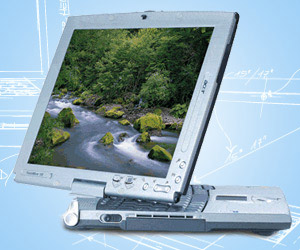
Before the TravelMate C100 was born, the Tablet PC was no different from a normal tablet. They are just digital devices with a touch screen used in the only feature that saves personal notes. They don't even have software to manage what users have entered.
The Acer TravelMate C100 dramatically changed the tablet concept with its 10.4-inch screen swivel joint. Along with the Windows Tablet Edition operating system, the C100 is the first true tablet in the world: Users can use it as a presentation board when folding or typing normally on the keyboard when opened. .
2. Apple PowerBook 500 series (1994)
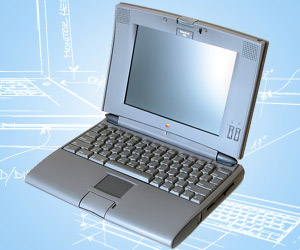
10 years ago, the only pointing device that worked with a computer was a trackball. The device went away when Apple introduced a new pointing device: the touchpad (trackpad). There are no moving components, the touchpad is more user-friendly and easy to use than trackball, especially suited to the portability of a laptop. So far, the touchpad and mouse button for the first time in the PowerBook 500 have become the default standard for laptops.
3. HP Pavilion dv2000 (2006)
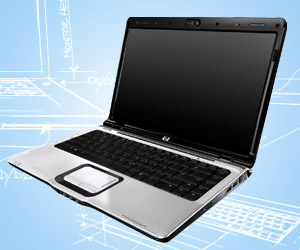
The secret to HP becoming the leading laptop manufacturer in the US: their Pavilion line has an excellent core and stunning outerwear. The Pavilion dv2000 marks the fundamental turning point of HP in its strategy: pushing the design of the model up to the level of performance. The whole machine is covered in glossy black shell in a luxurious piano tone. The interior is decorated with patterns with sustainable HP Imprint engraving technology. After HP's groundbreaking success, many other laptop companies also continually improve their product image. Dell added colors, and Gateway switched to bold designs.
4. IBM 701C TrackWrite (1995)
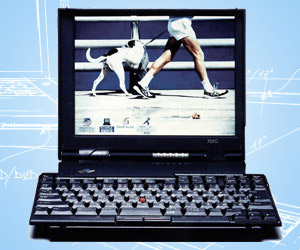
In contrast to the large weight, the laptop keyboard and screen at this time are small and difficult to read. IBM has made significant improvements to protect user wrists with the TrackWrite folding keyboard. Nicknamed "Butterfly Wings", the entire keyboard is divided into 3 "pieces" apart. When the computer lid opens, all 3 panels merge into a full-size keyboard. When closing the lid, turn each piece in turn and fold it neatly inside. Technological advances then led to more laptop models with larger space for the keyboard and TrackWrite quickly became obsolete. However, this is still a unique improvement that is remembered by many people.
5. Sony VAIO R505 SuperSlim Pro (1998)
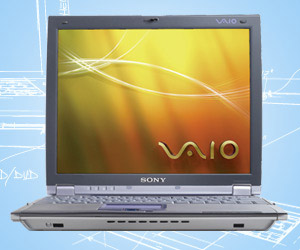
The light weight factor is especially important for mobile users. In 1998, Sony introduced the VAIO R505 SuperSlim Pro to shock the mobile world. Inside the stylish exterior with a 1-inch thick case is the "unparalleled" processing power: 30 GB of hard drive, Pentium III 850 Mhz chip and 256 MB of RAM. At that time, the machine was the dream of the tech people, although Sony had to sacrifice the optical drive to ensure the thinness of the product. In return, the fashion factor was cleverly pushed by the giant Japanese semiconductor company with a purple silver screen with mauve touchpad.
5 worst laptop models
1. Apple iBook (1999)
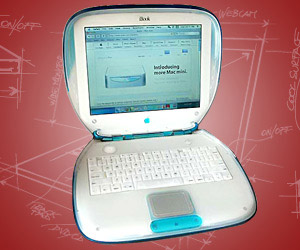
The first generation iBook brings customers right into two emotional states: love or hate. Unfortunately, too many people choose the second option for this chalk box computer. Apple tried to upgrade and improve this product line, but that effort was only recognized by some of the remaining features of the current MacBook product. iBook is still a dark spot in Apple's glorious history.
2. Dell Inspiron 5150 (2003)
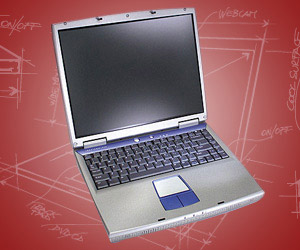
Design flaws not only on the outside of the product and Dell's Inspiron 5150 are an example. Improvements in this model's heat sink system suck the outside dirt into the machine through the vent. Overheating error occurred for more than half of Dell customers during September 2006. After that, the company had to pay 100% money back to the buyer to ease the situation.
3. IBM ThinkPad TransNote (2001)
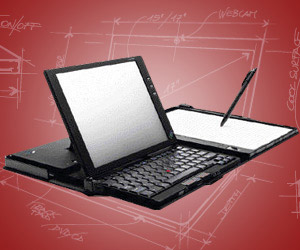
As laptops become popular, users become anxious whether to continue using pen and paper or replace them with powerful laptops. IBM wants to balance both streams of controversy with the IBM ThinkPad TransNote model. This is a regular ThinkPad but adds an American letter-size paper slot (8.5 x 11 inches) on the back. The whole device is placed on an electronic digital device to "translate" the user's notes through a special pen. Users can then rearrange them when turning the computer "face" up.
That may be a good idea, but the tablet that came out that year solved the problem much more simply. TransNote becomes a humiliating "neoclassical" device. On the other hand, the accompanying electronic pen is also big and not handy at all.
4. Sharp Actius RD3D (2003)

Development of new technology is an inevitable trend, but few can explain the motive that Sharp launched Actius RD3D products when incomplete. This is the first laptop in the world to have a 3D display screen, a proprietary technology of Sharp. Actius RD3D has an XGA 15-inch screen (1024 x 768) with false slots but it doesn't reproduce a true 3D image. Besides, there are numerous problems of display when images are striped, ghosts and eye fatigue. The device weighs nearly 5 kg and doesn't have a WiFi connection.
However, the fundamental weakness of Actius RD3D lies in the fact that too few applications are compatible with 3D imaging technology. Users can only "play" with some available software.
5. Velocity Micro NoteMagix L80 (2006)
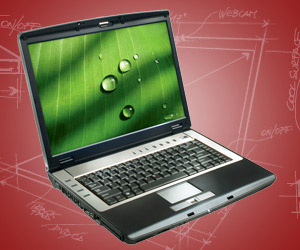
Velocity's NoteMagix L80 was badly evaluated for design, and people even asked if the designer was awake when he molded this product. The black case is exactly the same as the Generic Notebook Design 101. The worst is that the copper strips around the keyboard border make the laptop look like a 30-year-old product or it feels like it has lost its way. something that exposes the inner copper core.
Inside the silly design is the trendy devices including nVidia GeForce Go 7600 GS VGA card and 2.1 GHz Intel Core 2 Duo chip.
Hung Hai
You should read it
- ★ How to fix a Laptop does not recognize the keyboard
- ★ Fix the inactivity laptop keyboard error
- ★ How to lock the laptop keyboard to use the removable USB keyboard
- ★ How to turn off the Laptop keyboard to use an external keyboard
- ★ How to lock the Laptop keyboard, how to disable the Laptop keyboard